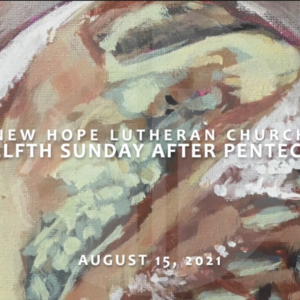John 6:51-58
[Jesus said,] 51 “I am the living bread that came down from heaven. Whoever eats of this bread will live forever; and the bread that I will give for the life of the world is my flesh.”
52 The Judeans then disputed among themselves, saying, “How can this man give us his flesh to eat?” 53 So Jesus said to them, “Very truly, I tell you, unless you eat the flesh of the Son of humanity and drink his blood, you have no life in you. 54 Those who eat my flesh and drink my blood have eternal life, and I will raise them up on the last day; 55 for my flesh is true food and my blood is true drink. 56 Those who eat my flesh and drink my blood abide in me, and I in them. 57 Just as the living God sent me, and I live because of God, so whoever eats me will live because of me. 58 This is the bread that came down from heaven, not like that which your ancestors ate, and they died. But the one who eats this bread will live forever.”
—————
Please pray with me this morning, church:
Nourishing God,
When we are hungry, feed us.
When we are weary, sustain us.
Fill us with yourself,
And send us to feed, nourish, and sustain a weary world.
Amen.
—————
“It’s like if chemistry and cooking got together and had a kid.”
Now, I do enjoy cooking, and I was terrible at chemistry, but the marriage of the two kinda grabbed my curiosity. That, and I really enjoyed the end product, so I thought, “What the heck, I’ll give it a shot.”
It was 2011 or so and one of our friends had told me that you could make 5 gallons of beer for a fraction of the cost per bottle, and it was the economics that ultimately pushed me over the edge.
I never really went all-in on brewing my own beer, but it was a fun hobby for a good number of years. One that I keep telling myself I need to get back into, get together with some of my friends, and really just something for me to do.
Hobbies are good for us. We need things outside of work and family, things that inspire us, that challenge us, that make us feel good.
A lot of folks picked up new hobbies a little over a year ago, toward the very beginning of this global pandemic. Did you? Anyone pick up baking or breadmaking? Anyone with their own little jar of sourdough starter sitting on your kitchen windowsill? How about knitting or crocheting or quilting? Any Tom Daley fans here this morning?
When this virus was very new and we really didn’t know anything about it, the world kind of shut down. Stay at home orders went into effect, restaurants and grocery stores almost shut down, people were quarantining away from one another. It was a really strange time. It all felt very isolating. Do you remember this? Do you remember that feeling?
We had to pivot and change the way we worshiped together as well. We went from live and in-person worship to worship on a screen in less than a week. We went from an assembly gathered and nourished and sent, to a scattered assembly, brought together in worship, though still feeling disconnected, isolated, even, from one another. It’s like we had the sense that we were worshiping together with those same folks we sat in the pews with just a few weeks ago, but we couldn’t really see them, we didn’t know for sure whether or not we were worshiping together with them.
It’s been a really long 18 months, church. And I’m sorry to say that we’re not done with it yet. Whatever we will be, ultimately, on the other side of this pandemic, is still a bit of mystery. The process of coming out of a pandemic is more like a faucet that you turn a little bit at a time, from a trickle to a full flow, rather than a light switch that you just flick on to full blast.
But what an opportunity we’re presented with. What an opportunity to take stock of and analyze our ministry together and ask tough, discerning questions about how we can best be the disciples that God is calling us to be.
But here’s the thing, this is an arduous journey. This is a kind of pilgrimage that you need to pack a lunch for. Maybe a few lunches. This process of reemergence and resurrection requires sustenance. You need to be well-fed for this journey.
A month ago, we launched into our worship series for the second half of the summer focusing on bread and feeding and nourishing, and anchored in this declaration from Jesus that “I am the bread of life.” And since then, we’ve been exploring the questions about what feeds and nourishes us, what sustains us in difficult times, and ultimately, what is it that we truly hunger for.
We’ve talked about the bread of life that we encounter in communion that sustains us, the sustaining presence we can be to one another, how generosity can feed and sustain us, and how it is we are called to nourish each other and especially people who we might not know.
This morning, Jesus gets very specific and even a little oddly morbid in his description. “Feast on me,” Jesus says, “Eat my flesh and drink my blood.” We talked a little bit last week about how we are called to sustain one another as the body of Christ, and this week, we’re going to take that idea a little further and how one of the ways we are sustained and sustain one another as the body of Christ is through worship.
Worship together is what has fed and nourished and sustained us so far through this pandemic, and worship together is what will feed and nourish and sustain us going forward, through the end of this pandemic and beyond it. Like Christ feeding us with Christ’s very own body and blood, we, too, feed one another. Like I said last week, whether here or for your neighbor or for someone you don’t know yet, you are the body of Christ, broken, poured out, and given for the sake and for the life of the world.
Worship together isn’t just a hobby we picked up, or something that we like to do on occasion when we feel like it, worship is a habit, it’s a practice. And you have to be committed to practices. They require intentionality.
And we don’t always get that intentionality right. Sometimes we need reminding. Like the promises we make a newly baptized member of this body and their parents. Promises to pray for, support, nurture, and lift them up at all times, but especially when things are difficult. Church, these are promises you made to Ryan, and Samuel and Megan and Lanie. You promise to love and care for and nurture them as part of this body.
They’re the same kinds of promises we make to our young ones this morning. These tags on their backpacks aren’t just cute little keepsakes…although they are cute. Church, these are tangible reminders for them that they have an entire community of faith rallying behind them, praying for them, blessing them, praying for their success, promising to do what we can to support and encourage them in their journeys.
Friends, this is what it means to be a community of faith. It’s a purposeful and intentional commitment to one another. It’s a purposeful and intentional commitment to our neighborhood. And to the world.
Like the promises of Jesus throughout all these bread texts over the past month, this commitment, this intentionality, these promises…this is what gives life. We can feed and nourish and sustain one another because we were first fed and nourished and sustained by the one who gives himself again and again for the life of the world, given so that you would have life, and life abundant.
Hobbies are a great brain break. They’re fun, you don’t have to think very hard about them…hobbies can be rejuvenating for us.
Hobbies are good for us.
But those things we bring ourselves fully to? Those things we invest ourselves into?
Those things we do with intentionality and purpose?
Those things to which we make promises…and do with commitment?
That’s what gives life.
That’s what feeds and nourishes and sustains.
That’s what abides.
Especially when life gets difficult.

